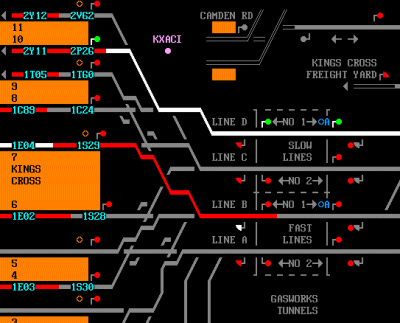

A good team player – Sharing knowledge and experience, collaborating and getting stuck in, enjoy the benefits of being part of our wider team. Comfortable working alone – Independent thinking, self-confidence and motivation are essential to operating effectively on your own. There’s lots to learn if you want to keep on growing and progressing. Good communication skills – share clear safety critical information with your colleagues and maintain the highest standards. Here are the things that matter in signalling. It’s more important that you’ve got the right transferable skills and behaviours. You don’t need any specific experience to start a career in signalling. Every day you’ll face new challenges, some you’ll expect and some you won’t, but each day you’ll take satisfaction that your training, problem-solving skills and quick thinking have helped passengers and freight get to their destination safely. This varies, depending on your grade and your location, but typically lower grade signallers will spend more time working by themselves, whereas higher grades often work more centrally, within larger teams. There’s a real mix of lone-working and team-working too. As every signalling box and operating centre is different, you’ll be given support and time to settle in, working alongside an expert signaller who’s familiar with your new location. This will give you a chance to put your training into practice, boost your confidence and start doing meaningful work every day.īut as a higher-level signaller, you could be taking charge of some of the UK’s highest profile and busiest lines. If you’re an entry-level signaller, you’ll complete a comprehensive training course before being paired with an experienced signaller in a signal box. We have opportunities for everyone, at every level to build a career with us. Individuals who are willing to learn, keen to develop and who want to transfer their skills here. We look for people who are genuinely interested in signalling. Rail yard engineers, and switch or signal operators may advance to become conductors or yardmasters.Signallers range from grades one to nine and although the level of responsibility varies, every signaller at every grade has passengers, freight and colleagues counting on them. Rail companies typically require a high school diploma or equivalent, and provide on-the-job training lasting from a few weeks to a few months, depending on the employer and the complexity of the job. Since trains operate 24/7, many railroad workers work nights, weekends, and holidays. Locomotive firers monitor train instruments and watch out for hazards on the track. Switch operators control the track switches in rail yards to ensure trains move safely between tracks. #Itrain signal trainin install
Signal operators install and maintain the communication signals along tracks and in the rail yard. Brake operators help couple and uncouple train cars. Other railroad workers focus on train safety.

Some operate small locomotives called dinkeys. They drive locomotives to and from maintenance shops or prepare them for the locomotive engineer. Rail yard engineers -also called hostlers- move locomotives between tracks to keep the trains organized and on schedule. A variety of railroad workers help ensure that passenger and freight trains are in the right place at the right time, operating safely.






 0 kommentar(er)
0 kommentar(er)
